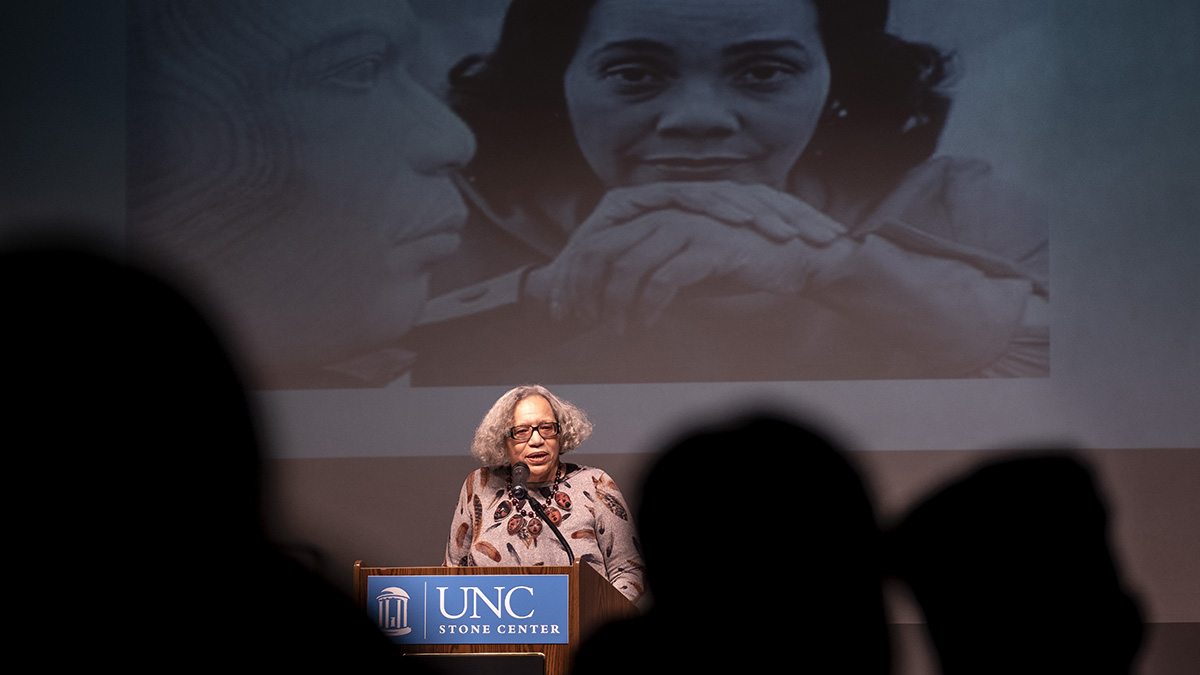Carolina celebrates a civil rights leader at annual lecture
Beverly Guy-Sheftall, an author and professor of women's studies at Spelman College, was the keynote speaker the University's annual African American History Month Lecture, examining the legacy of Coretta Scott King.

Coretta Scott King might be best known as Martin Luther King Jr.’s wife, but she was much more than the first lady of the civil rights movement.
She was a freedom fighter who passionately devoted herself to non-violent protest to improve society, said Beverly Guy-Sheftall, an author and professor of women’s studies at Spelman College.
Guy-Sheftall spoke on Scott King’s legacy as a civil rights activist for a variety of issues, from desegregation to gay rights, at the University’s annual African American History Month Lecture on Feb. 17 at the Sonja Haynes Stone Center for Black Culture and History.
The lecture examined Scott King’s progressive stances and activist efforts, which often placed her outside the traditional beliefs of the time. Scott King died in 2006.
“Writing about the lives of iconic figures in African American communities — especially the wives of famous men — is a perpetual challenge for scholars,” Guy-Sheftall said. “In the aftermath of Coretta Scott King’s death, it is imperative that feminist scholars like myself begin the challenging task of analyzing, assessing and making visible to a broader audience the fullness of her political commitments, many of which are odds with her public image.”
Guy-Sheftall’s lecture, which was sponsored by the College of Arts & Sciences’ history department and the Office of the Chancellor, was just one of many of Carolina’s African American Heritage Month events. Throughout February, University organizations are hosting lectures, panels and other activities to celebrate the observance.
Chancellor Kevin M. Guskiewicz said the events are a time to reflect on the impact African Americans have made throughout our country’s history. Understanding and engaging with that history — both the good and the bad — is the only way to reckon with our past as a University, he said.
“We know that injustice, exclusion and racism is a part of our history here at Carolina,” Guskiewicz said at the lecture. “We must continue to confront our history with concerted, sustained action so that we can move forward together. That is the reason we are here this evening — to engage with our history, to understand our relationship with it and to learn from it.”
Each year, the African American History Month Lecture features scholars and activists whose work centers on the lives of African Americans from both historical and contemporary perspectives.
The founding director of the Women’s Research and Resource Center and Anna Julia Cooper Professor of Women’s Studies at Spelman College, Guy-Sheftall teaches courses on feminist theory and global black feminisms. As director of Spelman’s Women’s Center, she has been involved with the development of student activism around a broad range of social justice issues.
In her lecture, Guy-Sheftall discussed Scott King’s vision of a “beloved community” — an idea made famous by her husband. While Martin Luther King Jr.’s concept of a beloved community was one that built on love and justice, Scott King’s philosophy, Guy-Sheftall said, was “bolder and more revolutionary than her husband’s.”
“Deeply committed to racial and economic justice, as well as non-violent social change, Coretta was an outspoken advocate for women’s rights, gay and lesbian rights, trade unions, affirmative action, world peace, universal health care, gun control, nuclear disarmament, the enfranchisement of convicted felons, HIV/AIDS education, prevention and treatment, that situated her outside of the mainstream of American politics, the civil rights establishment and organized religion,” Guy-Sheftall said.
The time has come, Guy-Sheftall said, to separate Scott King’s activism and beliefs from those of her husband. Doing so is crucial to properly understanding her place in the civil rights movement, not as the wife of a leader, but as a leader herself.
“When we retell, finally, the story of progressive black women’s activism in the 20th century and their visions of the beloved community, we can finally embrace Coretta Scott King as the truly revolutionary figure that she was already becoming as a college student.”




